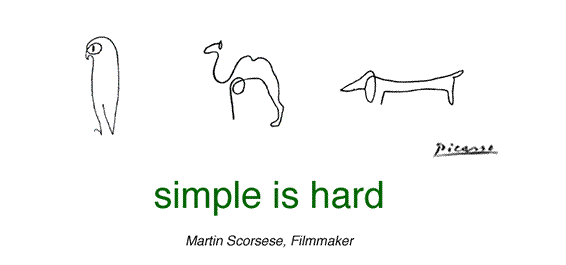On a personal note, I am alone (temporarily) for the first time in the past 30+ years for and extended period. A friend inquired as to how I was doing and asked, "It must be simpler?" His assumption, not incorrect, is that being on my own would be simpler than when I'm with my family and balancing other peoples wants and needs along with my own. But along with it came a pang of despair and loneliness. So I asked myself if simple really is better?
I think we humans have a much bigger capacity, and desire for complexity than our common wisdom would profess. I think it has more to do with how things which are complex make us feel. In a TED talk I saw John Maeda of RISD uses an example of a sunset like the one below to demonstrate our capacity for complexity.
The photo on the left is rather complex; lots of detail to the beautiful sky. The clouds interacting with the light of the sun setting provides a myriad of shades of color, contrast and hue. I simplified the picture on the right. I selected one color and replaced the complex sky with a simple, single color. So, does that mean complex is really better? I don't think it's that easy. Perhaps it's an oversimplification to say that we humans have a large capacity for that which pleases us, and a desire to diminish that which is dis-pleasurable.



The D’Alembert system was devised by Jean le Rond d’Alembert, a well-known known|a broadly known} 18th century French theorist. It’s a positive progressive system, fairly just like the Martingale, however it’s designed to cushion you from making fast and steep losses, all whereas recouping lost bets. Lose, and you embody a number to the top of the sequence. ● It’s not perfect for someone with a small bankroll, as find a way to|you presumably can} run out of cash rapidly or before you'll be able to|you presumably can} hit that 카지노사이트 much-awaited win. The massive idea behind the Martingale system is that the bettor will win the most important guess of the cycle. In our case, the Player won a total of $80 for a total guess of $70 ($10+$20+$40).
ReplyDelete